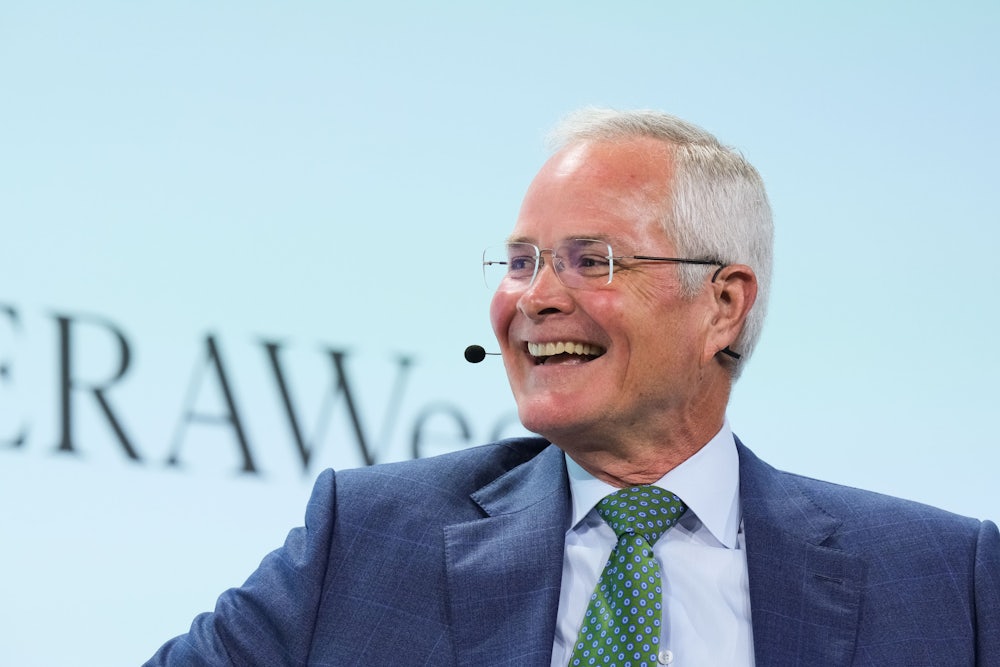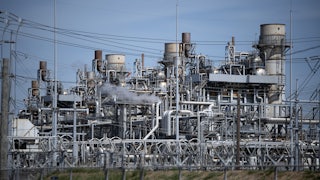For the last few years, oil and gas industry executives have talked a big game about their commitment to an “energy transition”—not their own transition, necessarily, so much as a coming global zeitgeist whose arrival they anticipate. Corporate leaders didn’t provide many details about what exactly would be transitioned to or away from or metrics for evaluating when such a transition could be said to have happened. Mostly, nobody asked.
That’s started to shift, as industry leaders appear to be embracing a somewhat novel concept for them: honesty. At an energy conference being held in Houston this week, CERAWeek by S&P Global, some CEOs seem to be giving up the act entirely. “We should abandon the fantasy of phasing out oil and gas,” Saudi Aramco Amin Hassan Nasser said in Texas this week. ExxonMobil chief Darren Woods—whose company is suing its own investors for asking it to strengthen internal climate targets—struck a similar tone. “We’re not on the path to make net-zero by 2050 currently, and one of the challenges here is that while society wants to see emissions reduced, nobody wants to pay for it,” he asserted on Monday at the same conference, sometimes referred to as the Super Bowl of energy. On Tuesday, ConocoPhillips CEO Ryan Lance even offered a rare expression of gratitude to the Biden White House, which has overseen record levels of oil and gas production: “Thank you to this administration.”
There’s still plenty of griping, especially about Biden’s alleged “ban” on approving new liquefied natural gas export facilities; in reality, it’s a temporary pause that has no bearing on facilities that are already operating, under construction, or that have gotten a green light from federal officials to move forward. But that the top brass of the oil and gas industry is striking an ever-so-slightly more copacetic tone should concern those of us who are not making millions of dollars off the extraction, production, transportation and sale of hydrocarbons. The Intergovernmental Panel on Climate Change reports that about 30 percent of oil, 50 percent of gas, and 80 percent of coal reserves will have to remain unburned if warming is to be limited to two degrees Celsius (3.6 degrees Fahrenheit). In any world that’s on track to meet even modest climate goals, companies built to sell as many fossil fuels as possible should be worried.
Maybe there’s a silver lining here: Witnessing this messaging pivot should make anyone who cares about the climate crisis—policymakers, especially—finally stop treating oil and gas executives as potential allies in the climate fight. Big Oil CEOs are making it easier than ever, that is, to see them clearly as the enemy. Last week, Shell followed the example set by BP and announced it would hold itself to a looser timeline to reduce its “carbon intensity,” i.e., the emissions from its drilling operations. Darren Woods, of Exxon, repeated a line he and his colleagues have become fond of in recent years. “I think one of the challenges is the way the problem has been stated in the past is, ‘We need to get rid of fossil fuels and natural gas [and] crude [oil] and coal,’” he told Yahoo Finance this week. “And I think what we should stay focused on is, ‘We need to get rid of the emissions associated with the combustion of those things.’”
To point out the potentially obvious, ExxonMobil and other fossil fuel producers have no remotely feasible plan to “get rid” of the emissions generated by the products they sell. The International Energy Agency estimates that the world will need to capture roughly one gigaton of carbon dioxide a year to reach net-zero emissions by 2050 and keep temperatures from rising above 1.5 degrees Celsius. As Bloomberg’s Eric Roston and Leslie Kaufman have pointed out, that’s 26 times the amount of carbon dioxide currently being removed now. “After nearly 50 years of commercial use and more than $83 billion in investment by governments and corporations, there are only about 40 large-scale facilities that have CCS; altogether, they capture roughly 45 million tons of carbon annually, or about 0.1% of global emissions,” Roston and Kaufman explain.
Helpfully, Woods did explicitly spell out why ExxonMobil is so interested in carbon capture despite repeated warnings from experts that climate plans shouldn’t rely on the still fledgling and exorbitantly expensive technology. “Carbon capture and storage allows you to continue to use existing energy systems but capture the emissions associated with the combustion in those energy systems,” Woods told Yahoo Finance in the same interview.
Darren Woods is insulting the intelligence of the people listening to him. Read even a little between the lines and about the subjects he’s talking about, and the upshot is obvious: We’re going to keep extracting and selling as many fossil fuels as we’d like for as long as we’d like. If there’s an upside from industry executives running their mouths this past week, it’s in making that philosophy—widely held across the industry—a lot easier to recognize.








